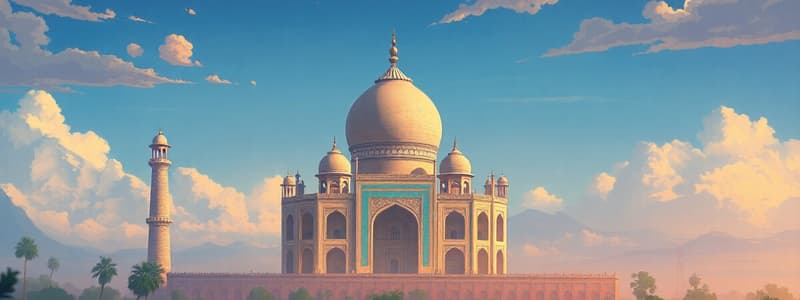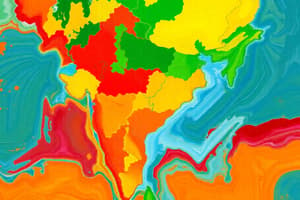Podcast
Questions and Answers
Which geographical feature significantly influences the duration of day and night in India?
Which geographical feature significantly influences the duration of day and night in India?
- Latitudinal extent (correct)
- Mountain ranges in the north
- The Indian Ocean
- Longitudinal extent
India's east-west extent appears visually larger than its north-south extent, despite the latitudinal and longitudinal extent being approximately 30 degrees.
India's east-west extent appears visually larger than its north-south extent, despite the latitudinal and longitudinal extent being approximately 30 degrees.
False (B)
What is the approximate land boundary of India?
What is the approximate land boundary of India?
15,200 km
The Standard Meridian of India, which is ______, passes through Mirzapur.
The Standard Meridian of India, which is ______, passes through Mirzapur.
Match the following locations/regions with their corresponding geographical description:
Match the following locations/regions with their corresponding geographical description:
Which of the following historical developments significantly reduced the distance between India and Europe?
Which of the following historical developments significantly reduced the distance between India and Europe?
India's strategic central location is primarily due to its extensive coastline on the Atlantic Ocean.
India's strategic central location is primarily due to its extensive coastline on the Atlantic Ocean.
Which ocean is named after a country, and what is the name of country?
Which ocean is named after a country, and what is the name of country?
India shares its land boundaries with Pakistan and Afghanistan in the ______.
India shares its land boundaries with Pakistan and Afghanistan in the ______.
Which of the following statements accurately describes India's geographical location?
Which of the following statements accurately describes India's geographical location?
Flashcards
India's Latitudinal and Longitudinal Extent?
India's Latitudinal and Longitudinal Extent?
India's mainland extends between 8°4'N and 37°6'N latitudes and 68°7'E and 97°25'E longitudes.
What is the Tropic of Cancer's role in India?
What is the Tropic of Cancer's role in India?
Divides India into almost two equal parts
Where are India's island groups?
Where are India's island groups?
Andaman and Nicobar Islands in the Bay of Bengal, and Lakshadweep Islands in the Arabian Sea.
What is India's total land area?
What is India's total land area?
Signup and view all the flashcards
What Percentage of the World Does India Cover?
What Percentage of the World Does India Cover?
Signup and view all the flashcards
What is India's rank by size?
What is India's rank by size?
Signup and view all the flashcards
What is the length of India's land boundary?
What is the length of India's land boundary?
Signup and view all the flashcards
What is the total length of India's Coastline?
What is the total length of India's Coastline?
Signup and view all the flashcards
What is India's Standard Meridian?
What is India's Standard Meridian?
Signup and view all the flashcards
Who are India's land neighbors?
Who are India's land neighbors?
Signup and view all the flashcards
Study Notes
- India is an ancient civilization that has achieved socio-economic progress, especially in agriculture, industry, technology, and economic development.
- India has contributed significantly to world history.
Location
- India is located entirely in the Northern Hemisphere.
- The mainland extends between 8°4'N and 37°6'N latitudes.
- The mainland extends between 68°7'E and 97°25'E longitudes.
- The Tropic of Cancer (23° 30'N) divides the country into two parts.
- The Andaman and Nicobar Islands are in the Bay of Bengal.
- The Lakshadweep Islands are in the Arabian Sea.
- Indira Point, the southernmost point of India, got submerged in 2004 during the Tsunami.
Size
- The landmass of India covers 3.28 million square km.
- India's area accounts for 2.4% of the total geographical area of the world.
- India is the seventh largest country in the world.
- India's land boundary is about 15,200 km.
- The total length of the coastline, including Andaman and Nicobar and Lakshadweep, is 7,516.6 km.
- India is bounded by young fold mountains in the northwest, north, and northeast.
- South of 22° north latitude, India tapers and extends towards the Indian Ocean.
- The Arabian Sea lies to India's west.
- The Bay of Bengal lies to India's east.
- The latitudinal and longitudinal extent of mainland India is about 30°.
- The east-west extent appears shorter than the north-south extent.
- There is a two-hour time lag from Gujarat to Arunachal Pradesh.
- The Standard Meridian of India (82°30'E) passes through Mirzapur, Uttar Pradesh.
- The Standard Meridian of India (82°30'E) determines the standard time for the country.
- Latitudinal extent influences the duration of day and night from south to north.
India And The World
- The Indian landmass is centrally located between East and West Asia.
- India is a southward extension of the Asian continent.
- Trans Indian Ocean routes connect Europe in the West and East Asia.
- The Deccan Peninsula protrudes into the Indian Ocean.
- The Deccan Peninsula helps India maintain close contact with West Asia, Africa, and Europe from the western coast.
- The Deccan Peninsula helps India maintain contact with Southeast and East Asia from the eastern coast.
- India has a long coastline on the Indian Ocean, justifying the ocean's name.
- Since the opening of the Suez Canal in 1869, India's distance from Europe has reduced by 7,000 km.
India's relationship with the world
- India's relationship with the world is old, especially through land routes.
- Mountain passes in the north provided routes for ancient travelers.
- These routes facilitated the exchange of ideas and commodities.
- The Upanishads, Ramayana, Panchtantra, Indian numerals, and the decimal system reached other parts of the world.
- Spices and merchandise were exported from India to different countries.
- Greek sculpture and architectural styles from West Asia influenced India.
India's Neighbours
- India has a strategic position in South Asia.
- It has 28 states and Eight Union Territories.
- India shares land boundaries with Pakistan and Afghanistan to the northwest.
- India shares land boundaries with China (Tibet), Nepal, and Bhutan to the north.
- India shares land boundaries with Myanmar and Bangladesh to the east.
- Sri Lanka and Maldives are the two island countries to the south.
- The Palk Strait and the Gulf of Mannar separate Sri Lanka from India.
- The Maldives Islands are located to the south of the Lakshadweep Islands.
Studying That Suits You
Use AI to generate personalized quizzes and flashcards to suit your learning preferences.




